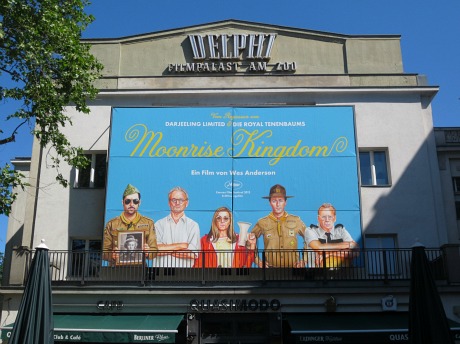 Jeffrey Wells
Jeffrey Wells
Kafka Rolls in Grave
For a good 20 or 30 minutes six or seven drunken animals were joking and bellowing under my second-floor bedroom window this morning, starting around at 5:30 am. They eventually woke me up. If this happens tomorrow I’m pouring a pan of water out of my window and right onto their heads. Prague’s Stare Mesto has become a Ground Zero for submental 20something louts — German, French, British, American. The pestilence is everywhere. Plus they’ve been spray-painting the bases of several old buildings with moronic slogans…cool!

Gunked Up
To some it wasn’t obvious that the part 3 syndrome (followup to a sequel to an original) would automatically diminish interest in Men in Black 3. Obviously not to a great extent — $19.6 million yesterday plus an $18 million Friday for a likely $56 million for the three-day weekend and $70 million including the Monday holiday — but how did anyone calculate it would make $90 million over four days?
Quality has nothing to do with an opening weekend haul. It’s always about lazy-brained Joe Schmoe expectations based on marketing. If you want to know how a film will do, ask the dumbest, least educated friend you know to drink nine or ten beers and eat junk food and then go to bed late after hitting several bars. At 7 am go over to his home and wake him up — “Whuh?” — ask him what he thinks about a film opening in two or three days time. Whatever he grunts out in his gunked-up, half-comatose state will tell you just about everything.
If you had asked this guy about MIB3 last Tuesday or Wednesday, he would have said, “Yeah, I don’t know, I guess so, I’ve heard Brolin’s good…but fucking part 3?”
Backwater
If you want to be right on top of the movie-exhibition world as it existed three or four weeks ago in the States, Prague is clearly the place to be. I’m written Expats.cz film critic Jason Pirodsky and Prague Post critic Andre Crous to ask if they’ll share info about critics’ screenings and email addresses of the publicists who arrange them. Prometheus, at least, opens on June 7th — one day before it opens in the States (but eight days after it opens in Paris).
Come Again?
The Occupy demonstrations were happening when David Cronenberg and crew shot Cosmopolis, which includes a couple of scenes of Occupy-like mayhem. It therefore seemed to him, he told the grinning French interviewer who always talks to talent before the Cannes press conferences, as if Cosmopolis had taken on the echo of a documentary.
In its use of conspicuous rear-projection CG to show what’s happening beyond the confines of Robert Pattinson‘s white stretch limo, Cosmopolis is obviously conveying the cut-off, insulated, vacuum-like atmosphere inside Eric Packer‘s head. The idea is clearly to not present reality as commonly digested. Tell me how that squares with Cronenberg’s comment. It was Don DeLillo’s 2003 novel that predicted the Occupy demonstrations. All Cronenberg did in this particular respect was follow DeLillo’s lead.
Big Miss
“One part The Night of the Hunter and two parts Huckleberry Finn, Mud may be born of the same rustic sensibility that fueled everyone from Andrew Wyeth to Terrence Malick, but director Jeff Nichols expresses this outlook in a decidedly personal way.
“Apart from tapping his two teen leads fresh from The Tree of Life — the creative equivalent of eating the heart of another to absorb his spirit — few of Nichols’ artistic decisions seem recycled from other sources, and even that kindred casting choice is fully justified by the plausibly naturalistic way both young thesps embody their characters.” — from Peter Debruge‘s 5.25 Variety review.
Here’s an mp3 of yesterday morning’s press conference. And stand-out quotes from same.
Sum-Uppers
Two Cannes-appraising podcasts have popped up — Deadline‘s Pete Hammond talking to some interviewer in the States (strictly audio) and TheWrap‘s Steve Pond (very faintly heard) talking to Sharon Waxman about Holy Motors (the likeliest Palme d’Or winner), embedded below.
Sasha Stone, Phil Contrino and I will be recording our sum-up tomorrow morning L.A. time, or around 5 pm or 6 pm Prague time. Unless Contrino begs off due to some family event and Sasha and I have to go it alone.
Neatly, Quickly
Not to nitpick but if you’re going to kill someone softly, you’re going to put something in their tea or coffee that will make them nod off first. Or you’ll inject something in their veins as they’re sleeping. Surprising them with bullets isn’t “soft” — it’s just (a) unanticipated on their part so they haven’t time to beg for their life, but (b) brutal as hell. So I’m sorry but the title of Andrew Dominik‘s new film isn’t quite right.
Basement Tapes
Two brief “Trailers From Hell” essays were posted three or four days ago, one from Brian Trenchard-Smith about Peter Glenville‘s Becket and the other delivered by John Landis, of all people, about Carol Reed and Lewis Milestone‘s Mutiny on the Bounty. Why aren’t these essays better written with better visual materials? And why aren’t they shot in 16 x 9?
One of Best Cannes Fests Ever
In a couple of hours I’ll be reading Twitter reactions to Jeff Nichols‘ Mud, which’ll begin screening in Cannes at 8:30 am, or 20 minutes from now. It has to be better than The Paperboy, McConaughey-wise, and given the way Nichols handled Get Shelter…well, here’s hoping. I’ve been told that it’s just okay. Not a sophomore slump effort for Nichols, but decent, good enough, respectable.
For me Cannes 2012 was one of the most intriguing and nourishing festivals I’ve ever attended. Lacking, perhaps, in terms of historic, earth-shaking whateverness, but every day and almost every film was interesting (except for the stinkers), and for the first time in over 15 years there was no alcoholic revelry to dull the vision or muddy the focus.
I’m writing this from Berlin, and by the end of the day I’ll be in Prague.



